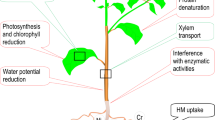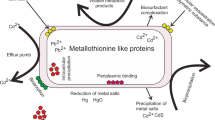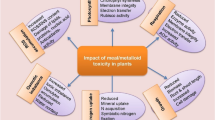Abstract
Anthropogenic activities are increasing the amount of heavy metals and metalloids in the environment on a global scale, harming all living things and necessitating the employment of bioremediation procedures. Metal-resistant bacteria were used to clean polluted soil and promote plant growth; this approach has gained attention in recent years for bioremediation of heavy metal-contaminated systems. We studied the effects of chromium and lithium in Oryza sativa under controlled conditions. In the present study, lithium concentration was applied 50 ppm to 200 ppm according to the dose tolerance level, while the concentration of chromium was 10 ppm throughout the experimental setup due to its concentration observed up to 10 ppm in the targeted soil, which is present in Kasur area Punjab, Pakistan, for rice crop production in future perspective. The results reflect that plants with high lithium concentration have shown decreased plant growth and development, but due to bacterial presence, they thrived until harvesting stage. Due to increase in stress concentration up to 200 ppm, decline in plant growth was observed, but after bacterial inoculation, better growth was seen (chlorophyll content increased to 40, and panicle numbers were more than 13). Our findings reveal that lithium and chromium have a direct negative impact on Oryza sativa, which can be minimized by utilizing halophilic microbes (Klebsiella pneumonia and Enterobacter cloacae) through soil–plant system.
Graphical Abstract








Similar content being viewed by others
Data availability
NA.
Abbreviations
- ANOVA:
-
Analysis of variance
- ACC:
-
Aminocyclopropane-carboxylic acid
- APX:
-
Ascorbate peroxidase
- CAT:
-
Catalase
- Cr:
-
Chromium
- cm:
-
Centimeter
- DW:
-
Dry weight
- EPS:
-
Extracellular polymeric substances
- EC:
-
Electrical conductivity
- FW:
-
Fresh weight
- GHG:
-
Greenhouse gas emission
- HM:
-
Heavy metals
- IRGA:
-
Infrared gas analyzer
- Li:
-
Lithium
- mg/kg:
-
Milligram per kilogram
- PGPB:
-
Plant growth-promoting bacteria
- Ppm:
-
Parts per million
- SDGs:
-
Sustainable development goals
- SRP:
-
Sustainable rice production
- SE:
-
Standard error
- TDS:
-
Total dissolved solids
- μmolg−1 :
-
Micromole per gram
- WHO:
-
World health organization
References
Ahmed M, Ji M, Qin P, Gu Z, Liu Y, Sikandar A, ... Javeed A (2019) Phytochemical screening, total phenolic and flavonoids contents and antioxidant activities of Citrullus colocynthis L. and Cannabis sativa L. Appl Ecol Environ Res 17(3). https://doi.org/10.1016/j.fshw.2019.07.004
Alka S, Shahir S, Ibrahim N, Chai TT, Bahari ZM, Abd Manan F (2020) The role of plant growth promoting bacteria on arsenic removal: a review of existing perspectives. Environ Technol Innov 17:100602. https://doi.org/10.1016/j.eti.2020.100602
Babu SOF, Hossain MB, Rahman MS, Rahman M, Ahmed AS, Hasan MM, Simal-Gandara J (2021) Phytoremediation of toxic metals: a sustainable green solution for clean environment. Appl Sci 11(21):10348. https://doi.org/10.3390/app112110348
Bakhat HF, Rasul K, Farooq ABU, Zia Z, Fahad S, Abbas S, Hammad HM (2020) Growth and physiological response of spinach to various lithium concentrations in soil. Environ Sci Poll Res 27(32): 39717–39725. https://doi.org/10.1007/s11356-019-06877-2
Bolan N, Hoang SA, Tanveer M, Wang L, Bolan S, Sooriyakumar P, ... Rinklebe J (2021) From mine to mind and mobiles–lithium contamination and its risk management. Environ Pollut (290):118067. https://doi.org/10.1016/j.envpol.2021.118067
Cakmak I, Marschner H (1992) Magnesium deficiency and high light intensity enhance activities of superoxide dismutase, ascorbate peroxidase, and glutathione reductase in bean leaves. Plant Physiol 98(4):1222–1227. https://doi.org/10.1104/pp.98.4.1222
Chakraborty S, Das S, Banerjee S, Mukherjee S, Ganguli A, Mondal S (2021) Heavy metals bio-removal potential of the isolated Klebsiella sp TIU20 strain which improves growth of economic crop plant (Vigna radiata L) under heavy metals stress by exhibiting plant growth promoting and protecting traits. Biocatalysis Agric Biotechnol 38:102204. https://doi.org/10.1016/j.bcab.2021.102204
Conte A, Chiaberge S, Pedron F, Barbafieri M, Petruzzelli G, Vocciante M, ... Pietrini I (2021) Dealing with complex contamination: a novel approach with a combined bio-phytoremediation strategy and effective analytical techniques. J Environ Manag (288): 112381. https://doi.org/10.1016/j.jenvman.2021.112381
Devi P, Kumar P (2020) Concept and application of phytoremediation in the fight of heavy metal toxicity. J Pharm Sci Res 12(6):795–804. https://doi.org/10.1371/journal.pone.0249147
Elgarahy AM, Elwakeel KZ, Mohammad SH, Elshoubaky GA (2021) A critical review of biosorption of dyes, heavy metals and metalloids from wastewater as an efficient and green process. Cleaner Engineering Technol 4:100209. https://doi.org/10.1016/j.clet.2021.100209
El-Metwally SA, Abou-El-Regal MM, Eissa IH, Mehany AB, Mahdy HA, Elkady H, Elkaeed EB (2021) Discovery of thieno [2, 3-d] pyrimidine-based derivatives as potent VEGFR-2 kinase inhibitors and anti-cancer agents. Bioorg Chem 112:104947. https://doi.org/10.1016/j.scitotenv.2021.146590
Gao JQ, Yu Y, Wang DH, Wang W, Wang CH, Dai HZ, ... Cen K (2021) Effects of lithium resource exploitation on surface water at Jiajika mine, China. Environ Monit Assess 193(2):1–16. https://doi.org/10.1007/s10661-021-08867-9
Guo S, Xiao C, Zhou N, Chi R (2021) Speciation, toxicity, microbial remediation and phytoremediation of soil chromium contamination. Environ Chem Lett 19(2):1413–1431. https://doi.org/10.1007/s10311-020-01114-6
Hayyat MU, Khan AU, Ali S, Siddiq Z, Sharif F (2020) Alleviation of lithium toxicity in Sorghum (Sorghum vulgare Pers) by inoculation with lithium resistant bacteria. Appl Ecol Environ Res 18(6):7989–8008. https://doi.org/10.15666/aeer/1806_79898008
Hoang HG, Chiang CF, Lin C, Wu CY, Lee CW, Cheruiyot NK, ... Bui XT (2021) Human health risk simulation and assessment of heavy metal contamination in a river affected by industrial activities. Environ Pollut (285):117414. https://doi.org/10.1016/j.envpol.2021.117414
Jat ML, Chakraborty D, Ladha JK, Rana DS, Gathala MK, McDonald A, Gerard B (2020) Conservation agriculture for sustainable intensification in South Asia. Nature Sustainability 3(4):336–343. https://doi.org/10.1038/s41893-020-0500-2
Khan MA, Asaf S, Khan AL, Adhikari A, Jan R, Ali S, ... Lee, IJ (2020) Plant growth‐promoting endophytic bacteria augment growth and salinity tolerance in rice plants. Plant Biol 22(5):850–862. https://doi.org/10.1111/plb.13124
Kolesnikov SI, Kazeev KS, Val’kov VF (2000) Effects of heavy metal pollution on the ecological and biological characteristics of common chernozem. Russ J Ecol 31(3):174–181. https://doi.org/10.1007/BF02762817
Kour D, Kaur T, Devi R, Yadav A, Singh M, Joshi D, ... Saxena, AK (2021) Beneficial microbiomes for bioremediation of diverse contaminated environments for environmental sustainability: present status and future challenges. Environ Sci Pollut Res 28(20):24917–24939. https://doi.org/10.1007/s11356-021-13252-7
Liu TZ, Chin N, Kiser M, Bigler W (1982) Specific spectrophotometry of ascorbic acid in serum or plasma by use of ascorbate oxidase. Clin Chem 28(11):2225–2228. https://doi.org/10.1093/clinchem/28.11.2225
Mokrani S, Nabti EH, Cruz C (2020) Current advances in plant growth promoting bacteria alleviating salt stress for sustainable agriculture. Appl Sci 10(20):7025. https://doi.org/10.3390/app10207025
Nayak S, Kale P (2020) A review of chromite mining in Sukinda Valley of India: impact and potential remediation measures. Int J Phytorem 22(8):804–818. https://doi.org/10.1080/15226514.2020.1717432
Nwogwu NA, Ajala OA, Ajibade FO, Ajibade TF, Adelodun B, Lasisi KH, ... Akinbile CO (2021) Phytoremediation mechanisms of heavy metal removal: a step towards a green and sustainable environment. In Innovative Bio-Based Technologies for Environmental Remediation ( 207–236). CRC Press. https://doi.org/10.1007/s11356-022-23390-1
Pathania P, Rajta A, Singh PC, Bhatia R (2020) Role of plant growth-promoting bacteria in sustainable agriculture. Biocatal Agric Biotechnol 30:101842. https://doi.org/10.1016/j.bcab.2020.101842
Prabha J, Kumar M, Tripathi R (2021) Opportunities and challenges of utilizing energy crops in phytoremediation of environmental pollutants: a review. Bior Environ Sustain 383–396. https://doi.org/10.1016/B978-0-12-820318-7.00017-4
Prasad S, Yadav KK, Kumar S, Gupta N, Cabral-Pinto MM, Rezania S, Alam J (2021) Chromium contamination and effect on environmental health and its remediation: a sustainable approaches. J Environ Manage 285(47):112174. https://doi.org/10.1016/j.jenvman.2021.112174
Raffa CM, Chiampo F, Shanthakumar S (2021) Remediation of metal/metalloid-polluted soils: a short review. Appl Sci 11(9):4134. https://doi.org/10.3390/app11094134
Rono JK, Le Wang L, Wu XC, Cao HW, Zhao YN, Khan IU, Yang ZM (2021) Identification of a new function of metallothionein-like gene OsMT1e for cadmium detoxification and potential phytoremediation. Chemosphere 265:129136. https://doi.org/10.1016/j.chemosphere.2020.129136
Sen Gupta G, Yadav G, Tiwari S (2020) Bioremediation of heavy metals: a new approach to sustainable agriculture. In Restoration of wetland ecosystem: a trajectory towards a sustainable environment (195–226). Springer, Singapore. https://doi.org/10.1007/978-981-13-7665-8_13
Shah V, Daverey A (2020) Phytoremediation: a multidisciplinary approach to clean up heavy metal contaminated soil. Environ Technol Innov 18:100774. https://doi.org/10.1016/j.eti.2020.100774
Sharma I (2020) Bioremediation techniques for polluted environment: concept, advantages, limitations, and prospects. In Trace Metals in the Environment-New Approaches and Recent Advances. IntechOpen. https://doi.org/10.5772/intechopen.90453
Shilev S (2020) Plant-growth-promoting bacteria mitigating soil salinity stress in plants. Appl Sci 10(20):7326. https://doi.org/10.3390/app10207326
Singh BM, Singh D, Dhal NK (2022) Enhanced phytoremediation strategy for sustainable management of heavy metals and radionuclides. Case Stud Chem Environ Eng 5:100176. https://doi.org/10.1007/s00411-022-00985-3
Srivastava N (2021) Phytomicrobiome: synergistic relationship in bioremediation of soil for sustainable agriculture. Phytomicrobiome Interact Sustain Agriculture, 150–163. https://doi.org/10.1002/9781119644798.ch8
Tang L, Hamid Y, Zehra A, Shohag MJI, He Z, Yang X (2020) Endophytic inoculation coupled with soil amendment and foliar inhibitor ensure phytoremediation and argo-production in cadmium contaminated soil under oilseed rape-rice rotation system. Sci Total Environ 748:142481. https://doi.org/10.1016/j.scitotenv.2020.142481
Tauqeer HM, Karczewska A, Lewińska K, Fatima M, Khan SA, Farhad M, ... Iqbal M (2021) Environmental concerns associated with explosives (HMX, TNT, and RDX), heavy metals and metalloids from shooting range soils: prevailing issues, leading management practices, and future perspectives. In Handbook of bioremediation (569–590). Academic Press. https://doi.org/10.1016/B978-0-12-819382-2.00036-3
Author information
Authors and Affiliations
Contributions
All authors contributed to the study conception and design. Material preparation, data collection, and analysis were performed by Z.T., M.U.H., F.S., Q.F.K., G.Z.G., L.S., and M.F.. The first draft of the manuscript was written by Z.T., M.U.H., Q.F.K., and all authors commented on previous versions of the manuscript. All authors read and approved the final manuscript.
Corresponding author
Ethics declarations
Ethical approval
Not applicable.
Consent to participate
Not applicable.
Consent for publication
All authors consent to the publication of this research paper and material.
Competing interests
The authors declare no competing interests.
Additional information
Responsible Editor: Robert Duran
Publisher's Note
Springer Nature remains neutral with regard to jurisdictional claims in published maps and institutional affiliations.
Rights and permissions
Springer Nature or its licensor (e.g. a society or other partner) holds exclusive rights to this article under a publishing agreement with the author(s) or other rightsholder(s); author self-archiving of the accepted manuscript version of this article is solely governed by the terms of such publishing agreement and applicable law.
About this article
Cite this article
Tahir, Z., Hayyat, M.U., Khan, Q.F. et al. Phyto- and bio-management of metal(loid)-contaminated soil by inoculating resistant bacteria: evaluating tolerance of treated rice plant and soil with its efficiency. Environ Sci Pollut Res 30, 122524–122536 (2023). https://doi.org/10.1007/s11356-023-30769-1
Received:
Accepted:
Published:
Issue Date:
DOI: https://doi.org/10.1007/s11356-023-30769-1




